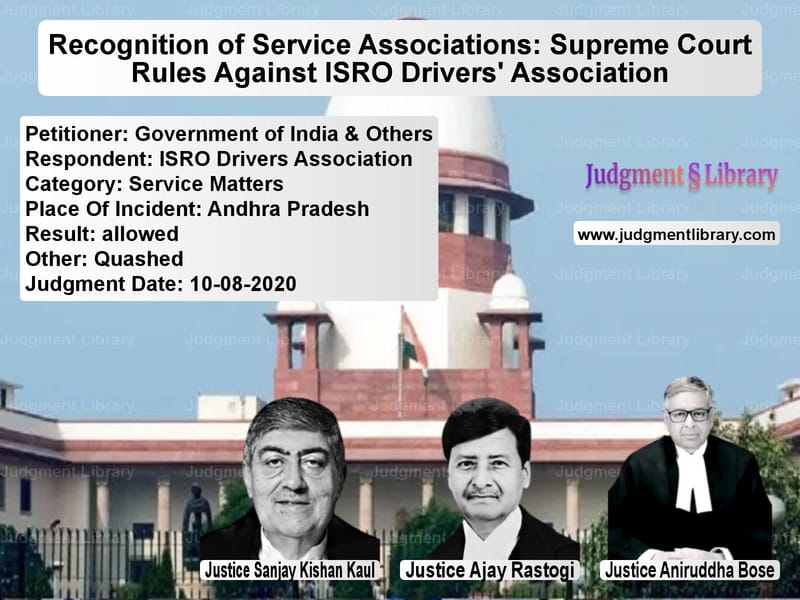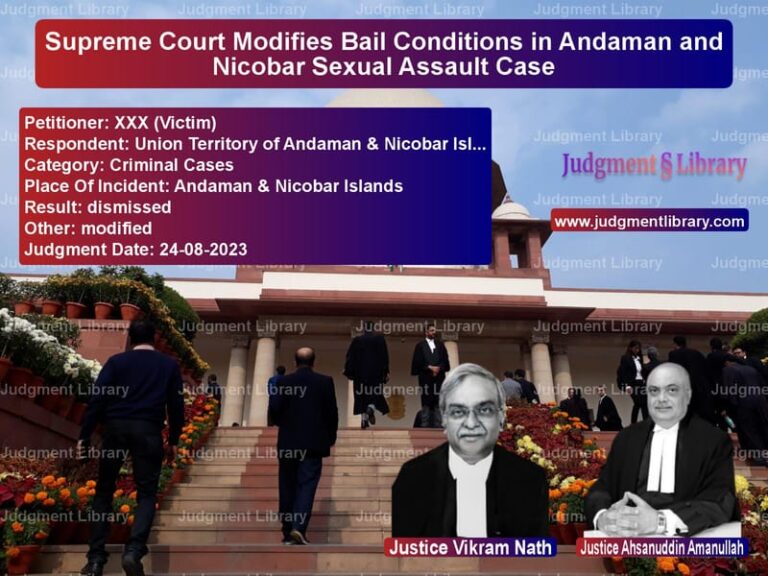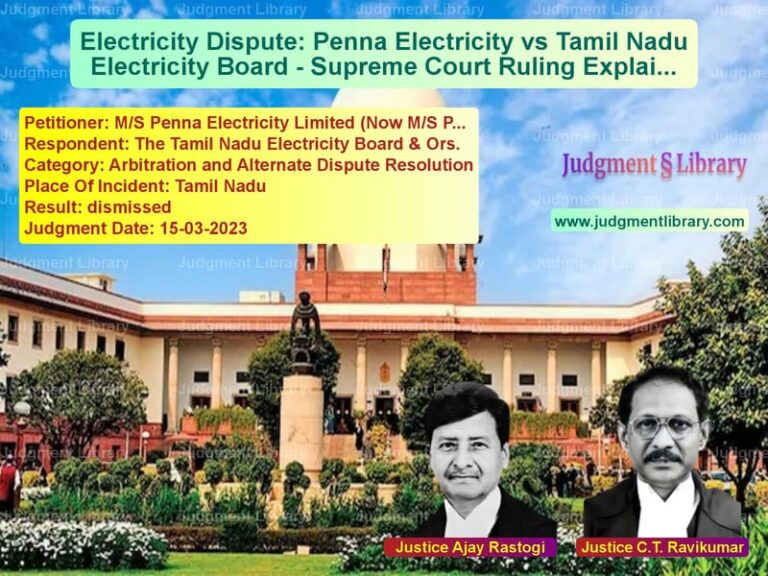Recognition of Service Associations: Supreme Court Rules Against ISRO Drivers’ Association
The case of Government of India & Others vs. ISRO Drivers Association was a significant legal battle concerning the recognition of service associations under the Central Civil Services (Recognition of Service Associations) Rules, 1993. The Supreme Court had to determine whether an association formed solely of drivers in a government unit constituted a ‘distinct category’ and was eligible for recognition.
Background of the Case
The ISRO Drivers Association approached the Andhra Pradesh High Court after their application for recognition was rejected by the government. The primary contention was that the association, formed exclusively of drivers working at SHAR Centre, a unit of ISRO, should qualify as a ‘distinct category’ under Rule 5(c) of the CCS (Recognition of Service Associations) Rules, 1993.
The government, however, argued that recognition should be granted only to associations representing a broader category of employees rather than those based on specific job roles such as drivers, stenographers, or tradesmen.
Arguments by the Petitioners (Government of India & Others)
- The term ‘distinct category’ under Rule 5(c) had not been explicitly defined in the rules.
- The Department of Personnel and Training (DOPT) issued a clarification in 1994 stating that the ‘distinct category’ should not be based on job roles but should represent a broader section of employees.
- The government sought to avoid the fragmentation of service associations based on individual trades, which could lead to administrative difficulties and weaken collective representation.
- The recognition process required that an association represent at least 35% of a category of employees, which the ISRO Drivers Association did not meet when considering the broader category of Group ‘C’ employees.
Arguments by the Respondents (ISRO Drivers Association)
- The association represented a distinct category of government servants, namely, drivers, all of whom shared common work responsibilities and interests.
- Drivers had specific service concerns that could not be adequately represented by a general employees’ association.
- More than 35% of the total number of drivers in the unit were part of the association, thus fulfilling the requirement for recognition.
- The rules did not explicitly prohibit associations based on job roles, making their exclusion arbitrary and unjustified.
Supreme Court’s Observations
The Supreme Court reviewed the legal provisions under the CCS (Recognition of Service Associations) Rules, 1993 and examined the government’s rationale for denying recognition.
- The Court noted that the scheme was designed to promote the common service interests of employees and to facilitate collective bargaining.
- The Joint Consultative Machinery (JCM) was introduced in 1966 to secure cooperation between the government and employees. Recognition under this scheme was meant for associations representing broader categories of employees.
- Allowing job-specific associations, such as those formed exclusively by drivers, stenographers, or technicians, could lead to excessive fragmentation and administrative inefficiency.
- The 1994 DOPT clarification correctly interpreted the rules to mean that a distinct category should include a wide range of employees rather than a single trade or job role.
Key Legal Findings
The Supreme Court ruled in favor of the government, stating:
- The definition of ‘distinct category’ in Rule 5(c) must be understood in the context of the entire JCM scheme.
- The clarificatory memo of 1994 provided a valid interpretation of the term, restricting recognition to broader employee groups rather than individual trades.
- Permitting trade-specific associations would lead to an unmanageable number of associations, defeating the purpose of collective representation.
- The ISRO Drivers Association did not represent a sufficiently broad category of employees to be eligible for recognition.
Final Judgment and Implications
The Supreme Court overturned the Andhra Pradesh High Court’s ruling and dismissed the appeal, stating:
“The literal interpretation in isolation of the term ‘distinct category’ made by the Division Bench of the High Court in the impugned judgment would not only defeat the primary object of the scheme of Rules 1993 but also the purpose with which the Joint Consultative Machinery has been formed.”
This ruling reinforces that service associations under the CCS (Recognition of Service Associations) Rules should represent broader sections of employees rather than specific job roles, thereby strengthening collective representation and administrative efficiency.
Petitioner Name: Government of India & Others.Respondent Name: ISRO Drivers Association.Judgment By: Justice Sanjay Kishan Kaul, Justice Ajay Rastogi, Justice Aniruddha Bose.Place Of Incident: Andhra Pradesh.Judgment Date: 10-08-2020.
Don’t miss out on the full details! Download the complete judgment in PDF format below and gain valuable insights instantly!
Download Judgment: Government of India vs ISRO Drivers Associa Supreme Court of India Judgment Dated 10-08-2020.pdf
Direct Downlaod Judgment: Direct downlaod this Judgment
See all petitions in Employment Disputes
See all petitions in Public Sector Employees
See all petitions in Recruitment Policies
See all petitions in Judgment by Sanjay Kishan Kaul
See all petitions in Judgment by Ajay Rastogi
See all petitions in Judgment by Aniruddha Bose
See all petitions in allowed
See all petitions in Quashed
See all petitions in supreme court of India judgments August 2020
See all petitions in 2020 judgments
See all posts in Service Matters Category
See all allowed petitions in Service Matters Category
See all Dismissed petitions in Service Matters Category
See all partially allowed petitions in Service Matters Category







